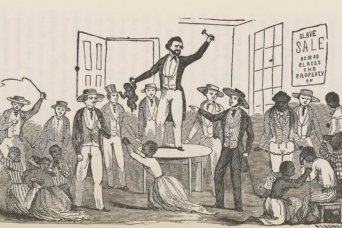- About
- Topics
- Picks
- Audio
- Story
- In-Depth
- Opinion
- News
- Donate
- Signup for our newsletterOur Editors' Best Picks.Send
Read, Debate: Engage.
A thing that it is often overlooked in popular discussions of the slave trade is the 'trade' part of the equation; so much, rightly, is focussed on the 'slaves' - who they were, where they were from etc. - that the actual economics and actors of the trade are forgotten. Even in pretty straightforward depictions of power, for example in the 2012 movie Lincoln, for example, we see Abraham Lincoln discussing the morality, the rationale, the effort behind ending slavery - and never once mentioning the idea that slavery, as it was practiced, was becoming more and more inefficient, if not entirely unprofitable (see, for example, Edward E. Baptist's book 'The Half that Has Never Been Told').
Slave-traders were entrepreneurs, just like any other business person; their commodity was human capital, human labour, human flesh. There were many acknowledged forms of labour, such as picking cotton, tilling land etc. but there were also unacknowledged forms of labour, such as sexual services for the slave owner, and the production of new slaves through pregnancy. It was an area where an entrepreneur could make a fortune from the exploitation of other human beings, from birth to death.
And yet, today, slave traders can make 25-30 times more money than their 18th and 19th century counterparts. What's more, this isn't just down to inflation.
The Guardian reports:
"Siddharth Kara, a slavery economist and director of the Carr Center for Human Rights Policy at Harvard Business School, has calculated that the average profit a victim generates for their exploiters is $3,978 (£3,030) a year. Sex trafficking is so disproportionately lucrative compared to other forms of slavery that the average profit for each victim is $36,000."
The UNODC’s Global Report on Human Trafficking, released last December, concluded that no country is immune from the crime of slavery. It identified more than 500 different trafficking “flows” or major routes between 2012-2014; with sex-trafficking being the most profitable type of slavery in each of these flows.
But there is also hope - some researchers, such as Kevin Bale, at the University of Nottingham and Founder of Free the Slaves has argued that with as little as 23 Billion dollars of investment, slavery in all of its forms could be eliminated within two generations. That is an investment worth making: this trade needs to be destroyed - it's the only way people will stop trading in human lives.
